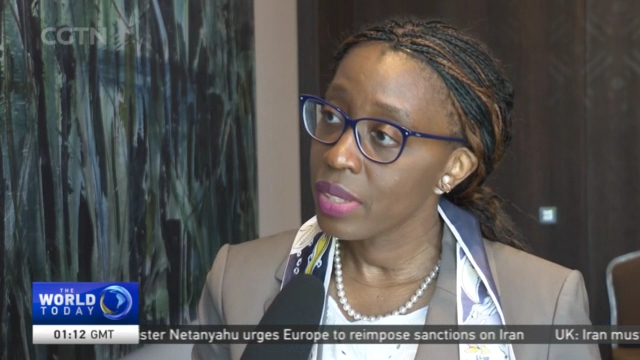
10:53, 08-Jul-2019
Africa's Free Trade Deal: CFTA aims to boost the proportion of intra-African trade
Updated
16:49, 09-Jul-2019

African leaders have officially launched the operational phase of the African Continental Free Trade Area Agreement at Sunday's African Union summit in Niamey. All but one of the 55 AU member countries, Eritrea, have now signed on to the deal. The AU says the agreement has laid the foundation for what could be the world's largest free trade zone. As CGTN's Ramah Nyang reports, there's still plenty of technical work that needs to be done before the formal launch in 2020.
RAMAH NYANG NAIMEY, NIGER "The formal launch has happened and the countdown to trading under CFTA rules 12 months from now begins. But between now and July 1st 2020, there is much to be done. Some countries are still deeply concerned about potential revenue losses may come in the free trade area."
VERA SONGWE, EXECUTIVE DIRECTORUNITED NATIONS COMMISSION ON AFRICA "Let's take it myth by myth. Tariffs: What is the CFTA going to do? The CFTA is going to take away 6% of the tariffs, we're going to do down to zero on 90% of the goods over a period of 10 years. Essentially, we're hoping - and we've seen this in many other free trade area agreements is that you create more jobs, you diversify the economy, and that gives you more growth, so that gives you more Value Added Tax, you get more personal income tax. So what you lose on the tariff side, you gain on the production and value added side because you are producing more industry, you diversify."
To deal with that specific problem, the Afrexim Bank offered one solution.
BENEDICT O. ORAMAH PRESIDENT & BOARD CHAIR, AFREXIM BANK "Our Board has approved a $ 1 Billion CFTA Fiscal Adjustment facility to support countries that will suffer fiscal revenue losses as a result of the CFTA implementation. We hope that this will help countries to accelerate the ratification of the CFTA."
RAMAH NYANG NAIMEY, NIGER "By removing tariffs on 90% of goods, and non-tariff barriers, the CFTA aims to boost the proportion of intra-African trade to 60% of total, by 2022. But most of that trade, especially outside monetary unions, takes place in a 3rd currency. To come to Niger from Kenya, for instance, my team used an Ethiopian Airline, and our tickets were priced in US Dollars. The Afrexim Bank estimates that currency conversions on billions of transactions like that one cost the continent at least $ 5 B a year."
Of course there's also no escaping the wider context of this trade deal. At a time when the United States has ignited trade disputes with the EU, her North American neighbors and China, and blocked appointments of new judges to the WTO, the CFTA was a reminder that even in a cynical age of narrow self interest, countries can still put common interests, over and above national ones.
ARANCHA GONZALEZ EXECUTIVE DIRECTOR, INTERNATIONAL TRADE CENTER "It's a path towards creating an internal market. I know it is difficult to convince people that you are serious about this, I went through the same thing in the European Union and I saw how difficult it was to convince the people that you are going to deliver that. But at the end of the day I also see when you do that, the benefits you bring to people. When you help very small markets that have very limited means of growing by purely trading within their borders, when you open this region to their traders, I know how much benefit this brings. So glass half full is my theory. Glass half full, and small steps forward."
RAMAH NYANG NAIMEY, NIGER "Even as the world's biggest free trade area takes shape, there are still negotiations left on what goods will be excluded from tariff liberalization lists, what sectors still need shielding - and more. Even after this meeting, policy makers will still have plenty of ground to cover. RN, CGTN, NIAMEY."
SITEMAP
Copyright © 2018 CGTN. Beijing ICP prepared NO.16065310-3
Copyright © 2018 CGTN. Beijing ICP prepared NO.16065310-3